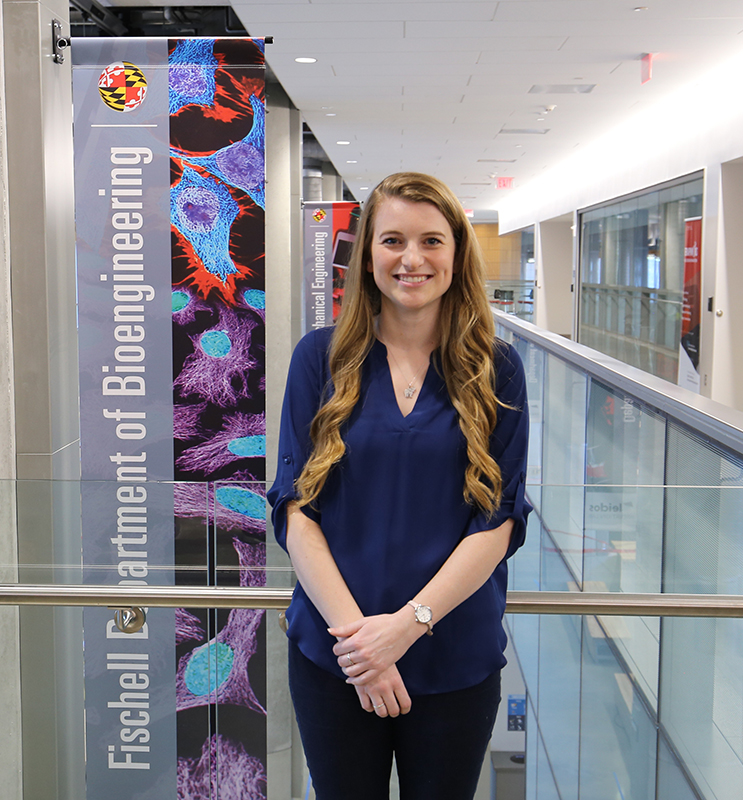
There is so much potential for us to make a difference.
Emily Gosselin is a Ph.D. student in Chris Jewell's Immune Engineering Lab, and is President of the UMD Chapter of the Bioengineering Graduate Student Society.
“I've always dreamed about improving the quality of life for patients,” Emily says. “As bioengineers, we're trained to find and develop creative solutions for problems facing the medical field. There is so much potential for us to make a difference - to help clinicians diagnose and treat patients so they can live longer, healthier, happier lives.”
Emily graduated from Tufts University in May 2015 with a B.S. in Biomedical Engineering. She is a member of the engineering honors society Tau Beta Pi, and graduated Magna Cum Laude. While at Tufts, Emily worked in Dr. David Kaplan’s Laboratory using silk fibroin as a biomaterial scaffold for cornea tissue engineering applications. For her work on this project, she earned the Tufts BME Senior Capstone of the Year Award and the Tufts Benjamin G. Brown Scholarship for research.
Now, the Ph.D. candidate focuses her studies of biomaterials on their capabilities as immune tolerance regulators. In early 2019, Emily received a NIH F31 grant for her research on Multiple Sclerosis therapies.
Multiple sclerosis (MS) is a debilitating disease that occurs when the body’s immune system incorrectly recognizes components of the central nervous system, causing inflammation and destruction of myelin, the fatty substance that surrounds and protects nerve fibers. When this happens, nerve fibers and cells are damaged, leading to a loss of motor function and other complications. According to the National Multiple Sclerosis society, the disease affects nearly 1 million adults in the U.S. alone.
“To lessen the immune system’s attack against the body’s healthy cells, conventional therapies often rely on general immune suppression – a strategy that has proven effective, but can leave patients susceptible to disease or infections,” Emily said. Emily is working with fellow researchers to develop therapies that promote selective immune tolerance to myelin.
To do this, she and fellow researchers are looking to target treatments directly to the lymph nodes, the body’s immune system “command centers.”
Lymph nodes are packed with different types of immune cells. Many of these cells respond to a particular disease or infection. Fragments of viruses, bacteria, and tumors collected in the lymph nodes are presented to these cells as antigens – molecules that provoke a response to a specific threat. When an immune cell encounters the antigen it recognizes, the cell “activates” and multiplies. The immune signals these cells receive in combination with the antigen determines the cells function – either inflammatory or regulatory. These cells are then released into the blood and tissue to hunt their specific targets.
With support from her NIH F31 grant, Emily aims to develop therapies that induce antigen-specific regulatory cells capable of selectively controlling disease.
“Our hope is to design therapies for MS that knock-down myelin-specific inflammation, while leaving the rest of the immune system intact,” she said.
To meet this goal, she aims to use a lymph node injection technique to deposit polymer particles co-loaded with myelin self-antigens and an immunomodulator known as rapamycin in mouse models of MS.
Top